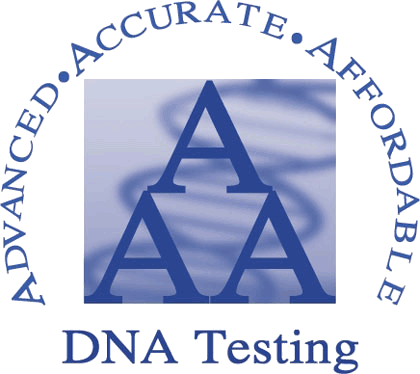To our valued clients and our colleagues, we want to thank you for 23 years of doing business with us at AAA DNA Testing, Inc. We have been honored to be your trusted source for DNA testing needs. After losing one of our founders this spring, it is time for us to retire. We are no longer taking new appointments.
If you are a previous client and need to get in touch with us, you can reach us at the same phone number. We will be happy to assist you. Thank you again.

Did You Know?
- Evening and weekend appointments are available. Give us a call to set up an appointment: (702) 515-1855
FAQs About DNA and Paternity Testing
- Why Should You Choose AAA DNA Testing, Inc.?
- What is DNA Testing?
- When should DNA be tested?
- How accurate are the results?
- How can DNA Testing help me?
- Can paternity be proven if the alleged father is deceased?
Why Should You Choose AAA DNA Testing, Inc.?
- Our DNA methodology is the most advanced and powerful available today, with results accepted by courts across the U.S. and abroad.
- Paternity results are normally available in just 2 - 3 business days, and rush testing is available.
- Genetic material is gathered using a simple and quick buccal (mouth) swab technique.
- Other sources of DNA such as hair, teeth, bone, blood and blood stains may also be tested.
- Our medically trained professionals understand and protect your need for confidentiality and privacy.
What is DNA Testing?
Each of us is born with a unique DNA (deoxyribonucleic acid) blueprint. One half of our DNA comes from our mother and the other half from our biological father and is present in nearly all types of cells in our bodies. DNA testing can determine paternity, maternity and other family relationships including siblingship questions. It can be stored to provide a method to identify us throughout our lifetime, and is used by law enforcement in a wide variety of criminal proceedings.
Back to TopWhen should DNA be tested?
- When anyone seeks peace of mind regarding parentage or other biological relationships
- When there are concerns about marital infidelity
- When paternity has not been established prior to the death of an alleged father
- When you are curious about your ancestry
- When parents are concerned about identifying a child should the unthinkable happen
How accurate are the results?
Typically results that prove paternity are reported as 99.99% or higher. If the alleged father is not the biological father, the probability of paternity is reported as 0%. These reported percentages are accepted as proof of paternity (or exclusion) in courts across our country and internationally.
Back to TopHow can AAA DNA help me?
- Child support and custody cases
- Ancestry Testing or Family Reconstruction
- Establishment of paternity of a deceased alleged father
- Suspected infidelity
- Immigration
- Twin Testing - Identical or Fraternal
- Reuniting Relatives Separated by Adoption
Can paternity be proven if the alleged father is deceased?
Yes, in many cases paternity can be proven after the death of an alleged father.
Typical scenarios include:
- If the alleged father has been killed in an accident or as a result of a violent crime, in many cases, the coroner's office has a blood spot card or other material that can be tested after it is released to us by the next of kin.
- Samples can be obtained at the mortuary prior to interment or cremation.
- Parents of the alleged father can be tested.
- Non-legal testing can be performed on baby teeth or from biological stains on clothing.
